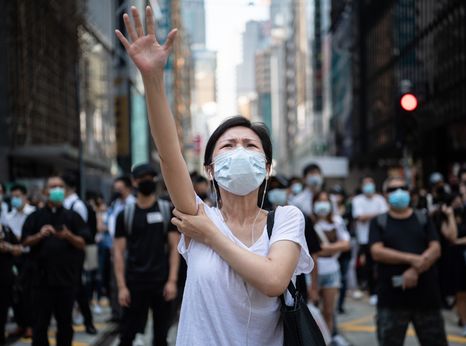15 democracy leaders arrested

On 18 April 2020, police arrested 14 prominent politicians, lawyers and activists, as well as one entrepreneur, for “organizing and taking part in unlawful assembly”. They are: Martin LEE Chu-ming, barrister, founding member of the Democratic Party (DP), former chair of the Hong Kong Bar Association and member of the Hong Kong Basic Law Drafting Committee; Albert HO Chun-yan, solicitor, chair of the Hong Kong Alliance in Support of Patriotic Democratic Movements in China (HK Alliance), former member of Hong Kong’s legislature (legislator) and former DP chair; YEUNG Sum, former legislator and former DP chair; SIN Chung-kai, chair of a local district council, member of DP Executive Committee and former legislator; AU Nok-hin, district councillor and former legislator; Richard Tsoi Yiu-Cheong, former district councillor, former DP Vice Chair and former HK Alliance Vice Chair; Cyd Ho Sau-lan, former legislator, former district councillor and co-founder of the Labour Party (LP); Lee Cheuk-yan, general secretary of the Hong Kong Confederation of Trade Unions, LP co-founder, former legislator and former HK Alliance Chair; Figo Chan, vice convenor of the NGO Civil Human Rights Front and member of the League of Social Democrats (LSD) Executive Committee; Jimmy Lai Chee-ying, founder of media group Next Digital; Avery Ng, former LSD Chair; Leung Kwok-hung (also known as “Long Hair”), LSD co-founder and former legislator disqualified by the court over his manner on taking the oath of office; Raphael Wong Ho-ming, LSD Chair; Leung Yiu-chung, district councillor and legislator; and Margaret Ng Ngoi-yee, barrister, member of the Civic Party Executive Committee and former legislator.
The 15 individuals were arrested for organizing and participating in “unauthorized assemblies” held on 18 August, 1 October and/or 20 October 2019. Five of them are also being prosecuted for announcing unauthorized assemblies on 30 September and/or 19 October 2019.
According to Articles 14–15 of Hong Kong’s Public Order Ordinance, those wishing to organize a protest are required to obtain a “notice of no objection” from the police before an assembly may proceed. Police have the power to prohibit public gatherings or impose requirements or conditions on public gatherings where the police “reasonably consider it necessary in the interest of national security or public safety, public order or for the protection of the rights and freedom of others”.
The Civil Human Rights Front filed application for organizing assemblies on the aforementioned dates, but the police issued letters of objection for all three applications. In fact, as protests became more frequent and larger in the second half of 2019, the Hong Kong police adopted a tougher approach to restricting public assemblies, ranging from revoking already-issued “notices of no objection” for marchers to objecting to protests outright on the grounds of “public security concerns”. From 9 June to 31 December 2019, the police banned 47 of 537 applications for public processions or meetings.
The 15 leaders organized and took part in rallies and assemblies on these three days in their personal capacity, without obtaining letters of no objection from the police.
International human rights law stipulates that anyone who wishes to hold a demonstration should be able to do so without requiring permission or authorization from the authorities. States may require prior notice of assemblies, but such notification regimes should not be unduly bureaucratic and should only serve the purpose of allowing the authorities to facilitate the conduct of assemblies and enabling them to take measures to protect public safety and the rights of others.
Since the the Umbrella Movement in 2014, many people have been arrested due to their involvement in protests taking place in 2014 and 2019. They were prosecuted on vague charges related to “unlawful assembly”, “unauthorized assembly” or “public disorder”. These vague and ambiguous charges appeared to be politically motivated and intended as a pretext to deter peaceful exercise of the rights to peaceful assembly and expression.